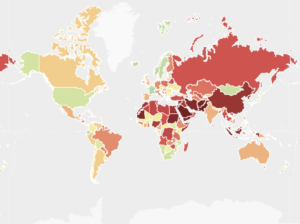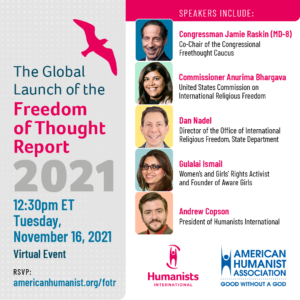AHA Launches Freedom of Thought Report for Humanists International

An important thing I know about international policy is that good intel about a situation or how legislation is being enforced is worth its weight in gold. It’s an obvious statement, but it’s a huge feat, especially when we’re trying to understand the impact on humanists or atheists—who often must conceal their identities for their own safety.
This means it can be incredibly difficult to track down the numbers, the de facto execution of the laws, or social pressures. Yet, I can’t walk into a meeting without reliable evidence to back up my requests. If I’m talking about how blasphemy laws in Bangladesh have been operationalized through so-called digital security laws, I need to be able to point to data about arrests. If I’m asking for greater pressure on Pakistan for their targeting of Ahmadis, I must be able to share examples of harassment and charges. And, unfortunately, the data and examples from the past few years have only gotten worse.
So much of this work requires combing through social media and news stories from small English-language news outlets in-country or reaching out to local folks (or folks who know local folks). It’s a ton of research, leading down rabbit holes and to dead ends, just to find the truth of what is happening to religious minorities in the name of someone else’s (or often their own) religion.
So nothing helps my work more than Humanists International’s annual Freedom of Thought Report, which tracks the rights and treatment of humanists and nonreligious people in every country around the world. If I need to know what laws restrict the rights of humanists in a particular country, I check out the report. If I need to know how secular the education system is, I check out the report. If I need to figure out how many humanists were charged with insulting religion in a country, I check out the report. You get the idea. But the report goes further. It captures elusive criteria, like social pressures and stigma, which are too commonly left out of reports of this scope. That is invaluable, and it takes a significant amount of time and resources to complete each year.

This year will mark the 10th anniversary of the report, and the American Humanist Association is proud to have been asked by Humanists International to host the report’s global launch event here in the United States. In years past, the launch has taken place at the European Parliament and the United Nations. This year, we are pleased to be able to host a virtual event, available to humanists and our supporters around the globe. Our guest speakers include:
- Congressman Jamie Raskin (MD-8), Honorary Chair of the event and co-chair of the Congressional Freethought Caucus
- Commissioner Anurima Bhargava, United States Commission of International Religious Freedom
- Dan Nadel, Director of the International Religious Freedom Office at the State Department
- Gulalai Ismail, Founder of Aware Girls and women’s rights activist
- Andrew Copson, President of Humanists International
This year’s report will also include two new boundary conditions: one on unregulated conscientious objection and another on the influence of religion in public life. The inclusion of these new criteria enables the report to more directly scrutinize the relationship between freedom of religion or belief and LGBTQ rights, women’s rights, and sexual and reproductive health.
The virtual launch event is free to attend. To learn more and register, visit our website.
